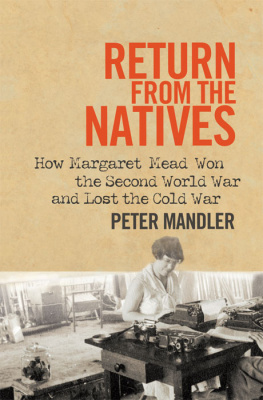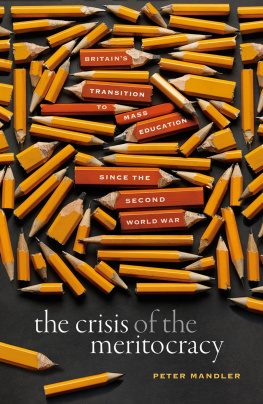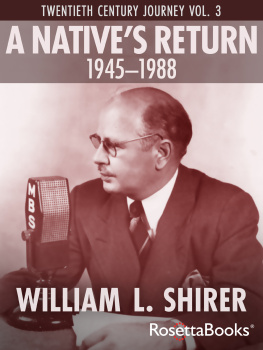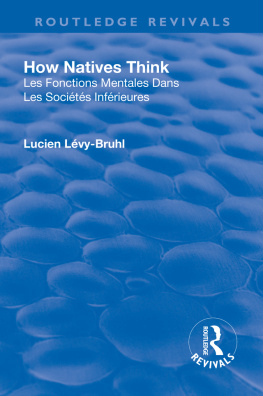Mandler - Return From the Natives
Here you can read online Mandler - Return From the Natives full text of the book (entire story) in english for free. Download pdf and epub, get meaning, cover and reviews about this ebook. publisher: Yale University Press, genre: History. Description of the work, (preface) as well as reviews are available. Best literature library LitArk.com created for fans of good reading and offers a wide selection of genres:
Romance novel
Science fiction
Adventure
Detective
Science
History
Home and family
Prose
Art
Politics
Computer
Non-fiction
Religion
Business
Children
Humor
Choose a favorite category and find really read worthwhile books. Enjoy immersion in the world of imagination, feel the emotions of the characters or learn something new for yourself, make an fascinating discovery.
Return From the Natives: summary, description and annotation
We offer to read an annotation, description, summary or preface (depends on what the author of the book "Return From the Natives" wrote himself). If you haven't found the necessary information about the book — write in the comments, we will try to find it.
Return From the Natives — read online for free the complete book (whole text) full work
Below is the text of the book, divided by pages. System saving the place of the last page read, allows you to conveniently read the book "Return From the Natives" online for free, without having to search again every time where you left off. Put a bookmark, and you can go to the page where you finished reading at any time.
Font size:
Interval:
Bookmark:



Copyright 2013 Peter Mandler
All rights reserved. This book may not be reproduced in whole or in part, in any form (beyond that copying permitted by Sections 107 and 108 of the U.S. Copyright Law and except by reviewers for the public press) without written permission from the publishers.
For information about this and other Yale University Press publications, please contact:
U.S. office:
Europe Office:
Set in Goudy by IDSUK (DataConnection) Ltd
Printed in Great Britain by TJ International Ltd, Padstow, Cornwall
Library of Congress Cataloging-in-publication Data
Mandler, Peter.
Return from the natives: how Margaret Mead won the Second world War and lost the Cold War/Peter Mandler.
pages cm.
ISBN 978-0-300-18785-4 (cl: alk. paper)
1. Mead, Margaret, 19011978. 2. World War, 19391945Influence. 3. Cold WarInfluence. 4. Cultural relativism. 5. AnthropologyGovernment policyUnited States. I.Title.
GN21.M36M36 2013
306dc23
2012051253
A catalogue record for this book is available from the British Library.
10 9 8 7 6 5 4 3 2 1
For Mel, and in memory of Audrey
Contents
Abbreviations
| AAA | American Anthropological Association |
| AID | Agency for International Development |
| ARPA | Advanced Research Projects Agency |
| ASTP | Army Specialized Training Program |
| BIA | Bureau of Indian Affairs |
| CIMA | Coordinated Investigation of Micronesian Anthropology |
| CIO | Congress of Industrial Organizations |
| CIR | Council on Intercultural Relations |
| CNM | Committee for National Morale |
| COI | Office of the Coordinator of Information |
| CSPR | Conference on Science, Philosophy and Religion |
| EPTA | Expanded Program of Technical Assistance (of the United Nations) |
| FMAD | Foreign Morale Analysis Division (of OWI) |
| FSI | Foreign Service Institute |
| HRAF | Human Relations Area Files |
| HRRI | Human Resources Research Institute |
| IPA | Institute for Propaganda Analysis |
| IPR | Institute of Pacific Relations |
| LSRM | Laura Spelman Rockefeller Memorial |
| M-O | Mass-Observation |
| MO | Morale Operations |
| MOI | Ministry of Information |
| MSA | Mutual Security Agency |
| NSF | National Science Foundation |
| OB | Overseas Branch (of OWI) |
| ONR | Office of Naval Research |
| OSS | Office of Strategic Services |
| OWI | Office of War Information |
| PWD | Psychological Warfare Division (of SHAEF) |
| PWE | Political Warfare Executive |
| R&A | Research and Analysis Branch (of OSS) |
| RCC | Research in Contemporary Cultures |
| SAA | Society for Applied Anthropology |
| SCC | Studies in Contemporary Cultures |
| SEAC | South-East Asia Command |
| SHAEF | Supreme Headquarters Allied Expeditionary Force |
| SSC | Studies in Soviet Culture |
| TA | Technical Assistance |
| TCA | Technical Cooperation Administration |
| UNESCO | United Nations Educational, Scientific and Cultural Organization |
| UNRRA | United Nations Relief and Rehabilitation Agency |
| WFMH | World Federation for Mental Health |
| WRA | War Relocation Authority |
Introduction
Return from the Natives
The journey out is also a journey home. When, at the end of the nineteenth century, the first modern anthropological fieldworkers went out in search of primitive peoples in the South Pacific and in the remoter parts of North America, they were not only looking for people different from themselves, they were looking for themselves as well. The common view then was the social-evolutionary one, that the varieties of humanity were arrayed along the rungs of a ladder of civilization, with primitive peoples at the bottom and modern Western peoples at or near the top but it was a ladder that peoples might travel along, some more slowly than others. The study of primitive peoples could therefore be a study of one's own ancestors, and perhaps not so very distant ones, either.
Some of these early fieldworkers developed such a sympathy for the primitive peoples among whom they lived that they began to doubt whether the ladder of civilization was really so long, or indeed whether it existed at all. And when the Great War dealt a series of stunning blows to the ideals of civilization those who witnessed mechanized slaughter in the fields of Flanders found it hard to feel superior to anyone, and the appeal of primitive simplicity (always an undercurrent in Western culture anyway) was vastly enhanced the anthropological enterprise changed dramatically. The ladder of civilization crashed down and appeared to come to rest on its side; the array of cultures now presented itself not vertically but horizontally. Peoples were still very different, but no longer stood in any obvious hierarchy. The idea of cultural relativism blossomed. In this new relation, primitive cultures in some ways seemed more different from so-called civilized ones: they were no longer the ancestors, just people who did things differently. This relation also offered new ways to compare cultures. Civilization was no longer the norm. If they do things differently, how does that make us look? Or, more powerfully, if they do things differently and we are no longer so obviously superior to them, so obviously the future of the past what might we learn from them?
These two impulses to use the observation of so-called primitive peoples, as the anthropologist Richard Handler has put it, Anthropologists could thus claim to be disinterested experts in intercultural or indeed international relations on a global scale.
This book is about the most famous anthropologist who ever lived Margaret Mead and her efforts to apply her tools, honed on primitive (or, as she came to call them, simple, homogeneous') peoples in the South Pacific, to problems of international relations between what she called contemporary peoples such as her own, the Americans, and her third husband's, the British. Between her return from Bali in 1939 and her return to New Guinea in 1953, Mead did no fieldwork among simple, homogeneous cultures and devoted herself very largely to theorizing, writing and lobbying on issues relating to contemporary, mostly Western, cultures. This period uncoincidentally spans the years of international crisis leading to the Second World War, the war itself and the renewed crises of the early Cold War. It represents one of the peak periods of social scientists involvement in public policy and a peak period, too, in their engagement with the popular imagination. Mead was determined that anthropologists should not lose this opportunity. The economists had won the First World War: that is, after the war they had become government's most trusted academic advisers. Here was anthropology's chance to take a place alongside them. Between the late 1930s and the early 1950s, her steel-trap mind fastened on the problems of international relations that mattered most to policymakers and the general public how to prevent a European war; once war had broken out, how to cement Anglo-American relations and how to defeat the Germans and the Japanese; then, after 1945, how to come to terms with the Russians and the Chinese; and, finally, how to create a new world order embracing all the peoples of the world.
Next pageFont size:
Interval:
Bookmark:
Similar books «Return From the Natives»
Look at similar books to Return From the Natives. We have selected literature similar in name and meaning in the hope of providing readers with more options to find new, interesting, not yet read works.
Discussion, reviews of the book Return From the Natives and just readers' own opinions. Leave your comments, write what you think about the work, its meaning or the main characters. Specify what exactly you liked and what you didn't like, and why you think so.







